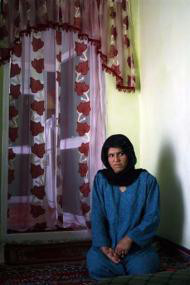
Nafisa, who lost her legs in a rocket attack 14 years ago, sits in her house in Kabul-Photo: AFP
Waheeda's arms were blown off in a suicide attack in the Afghan capital a few years ago. Flesh was also torn from one of her legs and she lost much of her vision. Her mashed face is split by an uneven scar.
Now about 35, she has six children but not much else.
"I cannot even drink water by myself," she weeps silently, dabbing at a tear with one of her stumped arms.
What is left of her limbs is covered by a black shawl that also partially hides red lumps of flesh on her neck and jaw.
"Of course, I would have plans if I had hands or eyes. But now I have half a body. I don't even have a husband," she said.
Her husband, a day labourer, was killed in the attack as he sat in the front seat of the minivan that was taking them home from a wedding.
Waheeda was dozing in the back of the van with her then three-month-old son in her lap and her arms resting on the front seat when the car bomb exploded directly in front of them.
Now she and her children live with her policeman brother, who supports them. Her daughters, both under 14, are her hands, cooking and cleaning and helping her to eat and drink.
In her humble room on a bleak hill overlooking the Afghan capital, home to four million people, Waheeda does not know where to turn for help.
"I don't know where to go or what to do," she says.
On the other side of the city lives 27-year-old Nafisa, who has an attractive face but no legs.
She waddles around her family's small and spotless home on her hips, unable to even use a wheelchair on her own because the rocket that destroyed her family about 14 years ago also mangled one of her hands.
She remembers the chilly autumn day the attack happened, when Kabul was in the midst of civil war as men still called national heroes fought to drive out Soviet invaders.
The family went into their courtyard to catch a little sun -- matriarch Sabzagul and her six children including the oldest, who was then 17 and engaged. She took her sewing machine out into the sunshine with her as she used it to earn some cash.
About a quarter were disabled at birth or during the first year of life and another quarter from war-related incidents, largely landmines, the survey found.
"There was the sound of a rocket," recalls the weathered Sabzagul. "It went past us. I told everyone: Let's move."
Then there was another one, she said.
"This time it caught us. I saw the legs of my daughter cut off from her body. I fainted. When I woke up I was in hospital," the 50-year-old said, a tear sliding down her cheek.
Four of her children were killed, including the young seamstress. Sabzagul lost a leg.
Sabzagul's family is one of the few to collect a government disability pension totalling 6,000 afghani (120 dollars) a year.
But it is not enough for them to live on and they rely on relatives and the little money that the only surviving son earns selling cigarettes and Nafisa can make from sewing for the neighbours.
Only about 87,000 disabled people -- a fraction of the total number -- have access to the government disability pension as it is only for victims of war, says Sami ul Haq from Handicap International.
A 2005 National Disability Survey undertaken by his organisation on behalf of the government found that 2.7 percent of Afghanistan's population was severely disabled.
For a population estimated by the UN Population Fund at about 29.9 million -- Afghanistan has never conducted a full census -- this is more than 800,000 people.
About a quarter were disabled at birth or during the first year of life and another quarter from war-related incidents, largely landmines, the survey found.
The government is expected to pass legislation that will ensure all disabled people are eligible for the pension and which will promote equal rights to jobs and education, said Sami.
But in reality they have few opportunities and many frustrations, which Sami said has implications for Afghanistan's fragile security besides the rights and social aspects.
To illustrate his point, he notes that the first suicide bombing in Kabul in 2005 was carried out by a double amputee.
The country's fragile security forces would have more success at recruiting staff if they guaranteed support to people disabled on duty.
Unlike Waheeda and Nafisa, 19-year-old policeman Mohammad Wassim is optimistic despite losing a leg a few months ago in a Taliban bomb blast that killed four of his colleagues.
He has been assured a job as an office assistant in the police department once he has adapted to his artificial leg, he said at a Red Cross orthopedic centre where is learning to walk again.
The centre, the Red Cross's largest in the world, helps disabled people regain their mobility and also tries to find them education and work, including by handing out small business loans.
Nearly all the employees in its Kabul office have some form of disability, including one man who had a limb removed by the previous Taliban government which used amputation to punish some "crimes".
The centre has changed the lives of thousands of Afghans but it can only offer basic, plastic prostheses, not the more sophisticated options available in some countries.
Waheeda had visited a few days earlier after hearing that the Red Cross might be able to fit her with an arm.
But the one she tried was too heavy for her spindly stump to lift, and the little hoped she arrived with evaporated.
"I just want one hand," she says softly.



